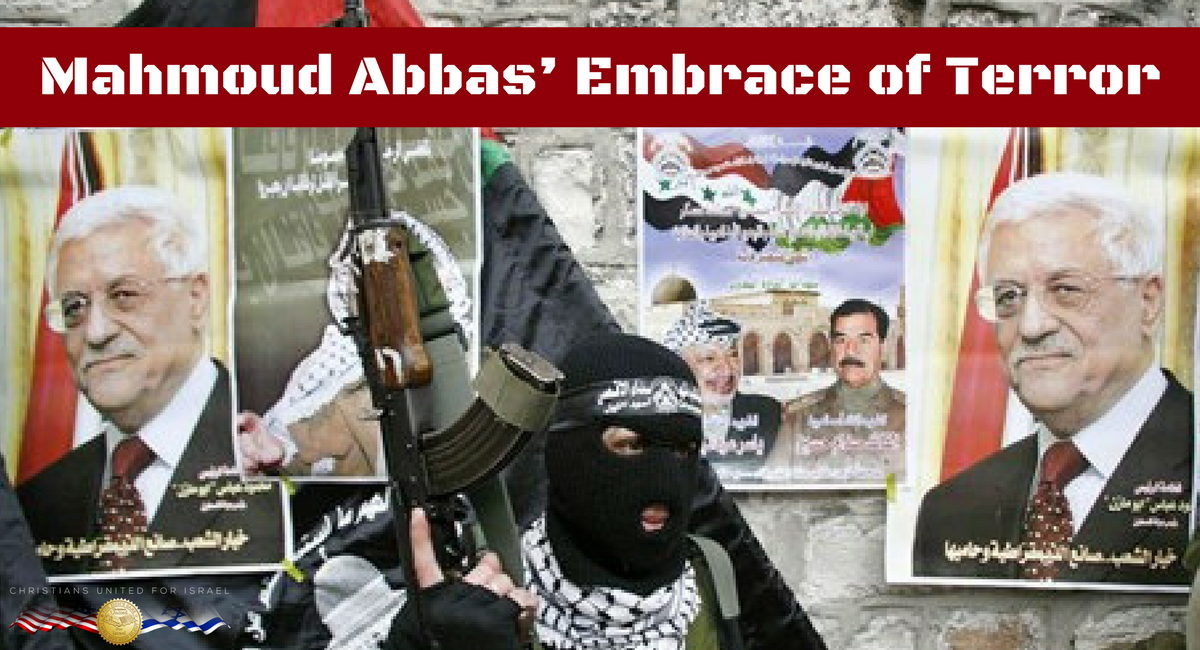Mahmoud Abbas’ Embrace of Terror

On March 5th, Palestinian President Mahmoud Abbas posted a photo on his Facebook page of him kissing the head of a 15-year-old boy named Osama Zaidat. This seems quite typical behavior for a politician. At least until one learns that Zaidat was recently released from Israeli detention after attempting to murder Israelis during the height of the stabbing intifada in September, 2016.
Abbas didn’t try to hide this literal embrace of terror. He proudly posted it on Facebook.
If only this were an isolated incident. It’s not. Abbas frequently meets with Palestinians who carried out terrorist attacks and the families of those who died in the act. And when he’s not meeting with them, he’s busy naming streets, town squares and stadiums after them.
If only Abbas stopped at merely glorifying terror. He doesn’t. He and the Palestinian Authority (PA) he runs provide rich financial rewards to terrorists. In 2016, PA payments to terrorists and their families exceeded $300 million.
These payments are not random acts of malice; they are required by law. Under Palestinian legislation the PA must pay generous salaries to terrorists who are arrested while attacking Israelis. The longer their sentence – i.e. the more Israelis they kill – the more money they receive. This same legislation requires that payments be made to a terrorist’s family when he or she dies in the course of an attack.
In an American court, you’re guilty of murder for hire whether you pay the killer before or after he does the deed. All that matters is that the payment has been promised. And
the PA has promised these payments for murder in the most reliable way possible – by act of law.
Recent news reminds us that it didn’t have to be this way. On March 12, Jordan released a man named Ahmed Daqamseh from prison. Daqamseh is a former Jordanian soldier who opened fire on a group of Israeli schoolgirls visiting the Israeli-Jordanian border back in 1997. He killed seven of them. While many see his 20-year sentence as insufficient, and his hero’s welcome home as disgusting, this story does have a bright side.
After the shooting, Jordan’s King Hussein — the late father of the current king, Abdullah II — did not rush to embrace Daqamseh. Instead, he rushed to Israel to embrace the parents of the murdered girls. King Hussein entered their homes, sat on the floor with them in the traditional Jewish fashion, and expressed profound grief for what his soldier had done. Hussein’s gesture forever endeared him to the citizens of a country used to being demonized by their neighbors.
Why is there peace between Israel and Jordan? Because King Hussein said “yes” to Israel’s peace offer. He said “yes” because he recognized the humanity of Israelis and the necessity of compromise. He said “yes” because deep down he hated the murder done in his name.
Why is there no peace between Israel and the Palestinians? Because Mahmoud Abbas and his predecessors said “no” to Israel’s peace offers. They said “no” because they fail to recognize the humanity of Israelis and the necessity of compromise. They said “no” because they celebrate and even reward the acts of violence done in their name.
And make no mistake about it, Israel’s peace proposals have been frequent and far reaching. The Israelis offered the Palestinians a state of their own on at least five separate occasions – in 1937, 1947, 1967, 2000/2001 and 2008. In 2008, the territory on offer included effectively all of the West Bank (with land swaps) and the Arab neighborhoods of East Jerusalem. Gaza was already under Palestinian control.
Abbas’ predecessors turned down the first four offers. Abbas turned down the 2008 offer. This rejection puzzled many observers. After all, Abbas was supposed to be different. He was supposed to the long overdue Palestinian moderate. Many still see him that way.
But it’s become increasingly apparent that Abbas is not—and never has been—the benign uncle of Israeli dreams. In our interconnected digital world, new evidence of Abbas’ true character is emerging almost daily. Do you want to know why Israel’s conflict with the Palestinians rages on? Look no further than Mahmoud Abbas’ Facebook page.